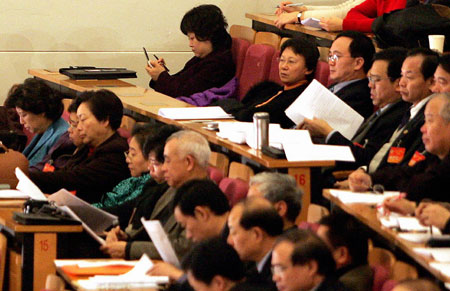Migrants get a voice in local congresses
Updated: 2008-01-22 07:28
Chen Huan, who works for a milk company in Beijing, could not hide her joy after seeing the list of deputies to the 13th municipal people's congress (MPC). "I really didn't expect to be chosen a deputy," she says.
 Deputies at a meeting of the Beijing people's congress on Sunday. [China Daily] |
A farmer in a Beijing suburb, Chen left her village years ago and became a so-called migrant worker in the capital. Though the city has millions of such workers, none of them had ever had a say in the local legislative body. But things have changed with this MPC, with two migrant workers being elected as deputies; Chen is one of them.
The deputies read the local government's work report on Sunday, when the first session of the MPC began, and will vote on the city's budget and elect officials, including the mayor, on the last day on Saturday.
Chen has been carrying a notebook since being elected a deputy to jot down suggestions and complaints of other migrant workers. She will submit a proposal to the MPC to improve the social security for farmer-turned-workers. "Since I've been elected a representative, I have to let people know what we migrant workers want," she says.
Among the 770 deputies to the MPC, about 60 percent are from the grassroots like Chen. Among them are 28 workers and 21 farmers, compared to 10 and 13 in the previous congress five years ago.
The legislature insists on greater participation of professionals such as lawyers and less so of government officials. Figures show the number of lawyer deputies has increased from 2 in the previous congress to 6 in the ongoing one, and the number of officials has fallen from 100 to 62. "Such changes will bring us more voices from the people," says Zhang Yue, deputy director of MPC's personnel department.
And this is not something unique to Beijing. Among Shanghai's 860 deputies, the number of prefecture-level or higher officials was 49 less than in the previous congress.
In Southwest China's Chongqing Municipality, migrant workers account for 5.86 percent of the 864 deputies, a first in the city's history. The percentage of officials has dropped by 3.9 to 432, says Ai Zhiquan, deputy secretary-general of the Chongqing people's congress standing committee.
Renmin University law professor Han Dayuan says fewer officials in legislatures mean greater access to grassroots deputies, with legislators becoming more representative of the general public. "Deputies from the grassroots level know more about social problems. Their participation will ensure that legislatures take more people-oriented decisions," he says.
Professor Dan Yanzheng of the Southwest University of Political Science and Law says the government wants more deputies from the grassroots level, especially migrant workers, to take a seat in the legislatures. "Migrant workers will gradually enjoy as many political rights as other groups," Dan says.
Scholars foresee more grassroots level deputies attending the annual session of the National People's Congress (NPC), the country's top legislature, in March. For the first time, there may be migrant workers' deputies at the national session, the say.
The 17th CPC National Congress last October charted the country's political road map. Party General Secretary Hu Jintao said at the congress: "People's democracy is the lifeblood of socialism. The essence and core of socialist democracy are that the people are masters of the country."
Xinhua contributed to the story
|
|
|
||
|
||
|
|
|
|